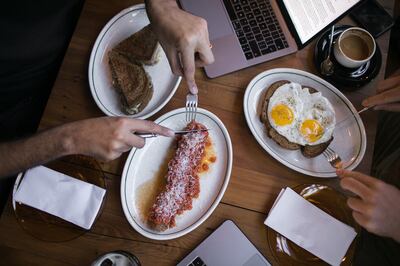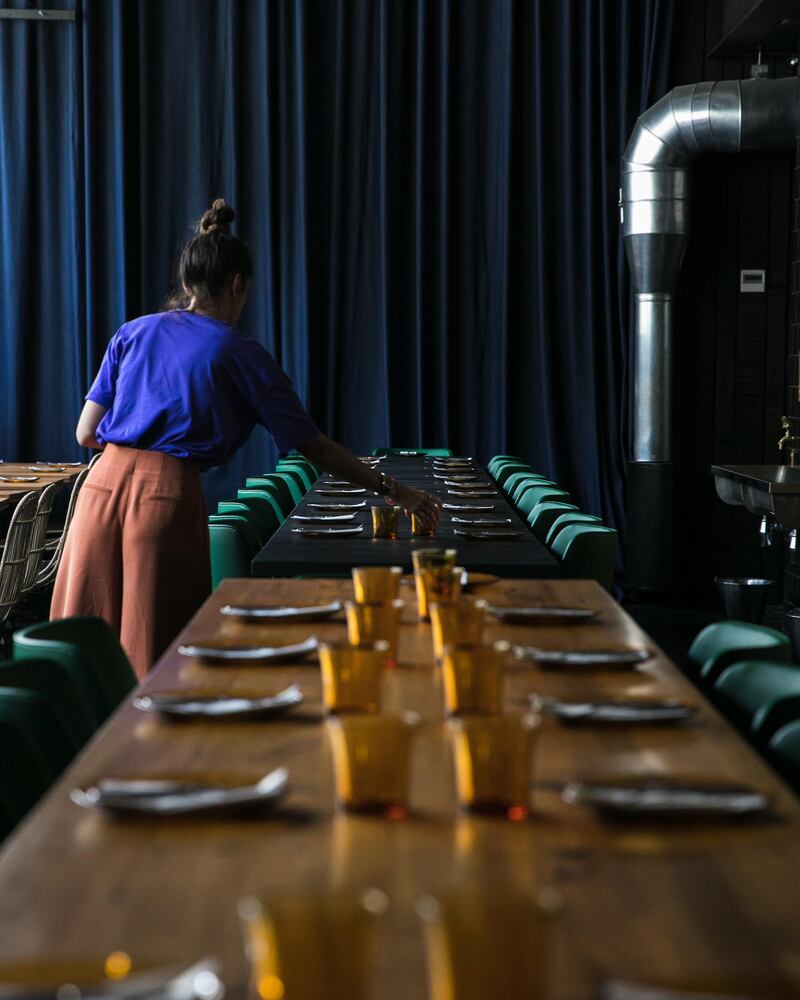What do you get if you take one Kiwi coffee connoisseur, an industrial roastery, beans sourced from farms in Burundi, Rwanda and Colombia, and a food menu brimming with influences from the Middle East, and plonk it all in the heart of Alserkal Avenue? The answer is Nightjar Coffee (although you may have been drinking the brand’s products for months without realising it).
The boutique coffee supplier has largely been operating under the radar for the last year and a half, building its industrial space in Al Quoz and roasting beans for some of Dubai's most well-known cafes. Nightjar supplies coffee to Roseleaf Cafe, Flow, Comptoir 102, Wild & The Moon, Surfhouse Cafe, Boston Lane and plenty of other favoured hangouts across the city.
And now, it might just be the most eclectic roastery-eatery that Dubai has seen in years. The homegrown concept that's been three years in the making, has thrown open the doors to its "showroom" in Alserkal Avenue, unveiling a labour of love by managing director Leon Surynt. Hailing from the coffee capital of Wellington, New Zealand, Surynt has been making caffeine-infused waves in the speciality-coffee scene since he moved to Dubai in 2008.
'We’re an Al Quoz, Dubai-based and homegrown brand'
A few years into his UAE stint, opportunity came knocking, but the timing wasn't right for him – so he suggested his wife, Rose Zeini, look into it instead. It came in the form of an empty space in the middle of the Dubai Garden Centre; a blank canvas that would soon become Roseleaf Cafe. "Roseleaf was a lovely accident," he says. "I saw the space in the Garden Centre and I couldn't do it – so I said to Rose that she should do it and she did, and has done a really amazing job with it."
Three years ago, he decided the time was finally right. He quit his job and set about establishing Nightjar – first as a green-bean supplier and then a boutique roastery, with more tangents to come. He teamed up with Raw Material, a direct-trade coffee company from NZ, to facilitate buying the beans directly from farmers in Colombia, Burundi and Rwanda. It was a point of difference for Nightjar, which could then import green beans (that haven't yet been roasted or highly processed), and sell them on to other cafes and suppliers.
“Everyone else is dealing with traders from the United Kingdom or Malaysia or wherever, and you can be paying US$3 a kilo or $8 [Dh11 or Dh29]. And the people who are making the money are the traders and not the farmers,” Surynt explains. “I want to pay a premium for my product and look after the people who are farming for us … and for that freaky, high-end, picked-under- moonlight kind of coffee.”
But for him, it's been crucial from the start to establish Nightjar as a space that was ingrained in its surroundings. "What I wanted to create was something that's very in line with Al Quoz. I'm not a Melburnian cafe or a London cafe – and just because I'm from New Zealand doesn't mean anything. We're an Al Quoz, Dubai-based and homegrown brand. This area is full of blue-collar workers, it has history and vibe. We're here to serve them."
Inside the showroom
This showroom, Surynt says, is intended to act as not only an eatery and cafe, but also a flagship to showcase everything the brand is about. It’s a multi-use venue, with a design that sits somewhere around “industrial, with a sense of luxury”. Indeed, the interiors are an eclectic mix of the two. The couches are wrapped in camel skins sourced near Saudi Arabia. The wraparound bar is low, allowing customers to see over the counter where their coffee and food is being prepared. There’s a communal wash-up area. And there’s a giant blue curtain. “We wanted a sense of theatre, too. We’ve got that big curtain – but it’s a denim curtain. It’s a workingman’s curtain.”
All the furniture was made in New Zealand and shipped here, and much of the interior is decked out in pine sourced from the country’s west coast, to create layers of soundproofing. That’s topped with a “wicked sound system”, to create a space with some impressive acoustics.
'It’s the flavours of Al Quoz'
Food was always on the cards, it's just taken a little longer to deliver. The problem was, no one had actually attempted to start a business that allowed importing, supplying, manufacturing, trading and operating a cafe all at once. That meant complications like trade licences modified to include cafe and restaurant additions – a modification Surynt believes he may have been the first beneficiary of in the city. However, it did mean a six-month delay in opening due to the need to ensure that the site complied with more than one building code. "It just shows you how progressive Dubai is getting. They are strict with their rules, but they really want Alserkal to be something special."
The quirky menu was dreamt up with the help of Mumbai-born Ved Navghare, the former head chef at famed modern Indian restaurant Tonka in Melbourne. The result? Dishes that feature Khawaneej goats curd, oysters from Dibba Bay, paratha, and Arabic fig and walnut jam. The price point is supposed to fit the surroundings, too; two organic eggs on toast will only set you back Dh26. “It’s the flavours of Al Quoz,” Surynt says. “You can go around the corner and get a dal and bread or a chicken – so we’ve got a chicken roaster, but it’s Dubai-ified.”

They're now focusing on developing specialised coffee products and store concepts – the first of which is brewing in an upstairs space dedicated to all things cold-brew – which will be served on tap at the likes of Zuma, Soho Garden, Lucky Voice, The Scene by Simon Rimmer, Mr Miyagi's and plenty more – as a key component of beverage recipes.
Surynt believes Nightjar is now one of the only true direct coffee companies in the UAE. It's allowed a steady supply of green beans to enter the UAE market, as well as the idea of genuine, ethically sourced coffee. Just don't try and compare his venture to his wife's. "Look at it this way: this is the masculine and Roseleaf is the feminine. Yes, she's my wife and yes, she's done a great job, but I don't operate Roseleaf and she doesn't operate Nightjar."
_______________________
Read more:
Review: garden party meets farmers' market at Brunch at the Palace
Gordon Ramsay to open a Hell's Kitchen restaurant at Caesars Dubai
How Zuma Dubai has managed to stay relevant for 10 years
_______________________
In short, this spot views itself as much more than just a roastery, or an eatery. Surynt views it as the "hearth" of Alserkal, and a place where they'll keep pushing the boundaries of coffee-making. "I live by three mantras – the first is make it good. This means making it good for the farmer who's producing it, and making it good by the cold brew I'm serving. The next is making sure all things are considered. And the third is just to give a damn about what we're doing," he says.






